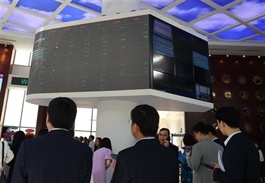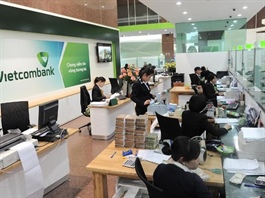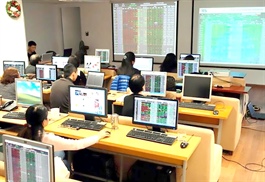Stock market on the cusp of key threshold
Stock market on the cusp of key threshold
Upcoming reclassification is energising Vietnam’s stock market, as investors brace for a new potential wave of foreign capital and long-term structural shifts.
Ahead of FTSE Russell’s reclassification review on October 8, investors are anticipating billions of US dollars in foreign capital inflows into Vietnamese equities. However, foreign investors net sold nearly $72 million on October 1, including $63.8 million through order-matching transactions.
After net buying nearly $320 million in July, foreign investors turned to strong net selling in August and September, with respective values of over $1.2 billion and $920 million. As a result, their cumulative net selling reached over $3.44 billion in the first nine months of 2025.
Truong Hien Phuong, senior director at KIS Vietnam Securities Corporation, noted that part of the foreign selling pressure could stem from frontier market-tracking funds, while emerging market-tracking funds will likely begin accumulating positions closer to the effective date.
“If Vietnam is upgraded in the review, the market will see substantial foreign inflows from emerging market-tracking funds, which are dozens of times larger than those tracking frontier markets,” he added.
Nguyen The Minh, head of Research and Development for Retail Clients at Yuanta Securities Vietnam, observed that foreign net selling may persist even after an upgrade.
“The selling pressure intensified towards the end of the third quarter as foreign investors closed their books and took profits following VN-Index’s strong rally, while also reacting to movements in the USD/VND exchange rate and interest rate differentials,” he explained.
“The upgrade process is still in its early stages, and there are further milestones ahead, such as the FTSE Russell secondary emerging classification and MSCI. Meeting these higher standards will help Vietnam’s stock market attract more foreign capital,” Minh added.
Dr. Nguyen Duy Phuong, Investment and Strategy director of DG Capital, said international experience shows a more nuanced picture: indices and liquidity often behave unpredictably around and after upgrades.
“While some markets experience rallies, others take years to grow, or even undergo short-term corrections. Being upgraded to secondary emerging market status doesn’t mean an immediate flood of foreign capital. Large funds typically disburse gradually, depending on liquidity, stock quality, and the ability to repatriate funds safely,” Phuong said.
As Vietnam edges closer to the upgrade threshold, a wave of capital increases among securities firms is reshaping the industry landscape.
Last week, KIS Vietnam announced plans to hold an extraordinary general meeting (EGM) on October 15 to seek shareholder approval for issuing over 78.9 million shares to existing shareholders at 40 US cents per share, raising an estimated $31.6 million. If successful, the company’s charter capital will rise to over $182 million.
At its EGM on September 25, SSI Securities Corporation approved a plan to issue 415.6 million shares at a 5:1 ratio and 60 US cents per share. Proceeds are expected to reach $249.4 million, increasing SSI’s charter capital to $999 million.
In September, VNDIRECT released materials outlining plans to issue up to 325.77 million shares to existing shareholders at a 5:1 ratio, priced at 40 US cents per share, potentially raising $130 million.
Other mid-sized firms are following suit with large capital-raising programmes. LPBank Securities, for example, launched a rights issue of up to 878 million shares from September 15 to October 15, which could boost its charter capital from $155.5 million to $506.7 million.
Tien Phong Securities also approved a plan to issue 287.9 million shares to TPBank at 50 US cents per share, raising its capital from $134.4 million to $249.6 million. Meanwhile, HD Securities is preparing to issue over 365 million shares at 80 US cents per share to lift its capital to more than $204 million to support expansion.
Phan Le Thanh Long, CEO of AFA Group and founding chairman of the Vietnam Wealth Advisors added, “There’s a shift in domestic institutional capital. While retail investors dominate, domestic institutions, especially proprietary trading desks and investment funds, are playing an increasingly key role. This is part of a broader restructuring strategy to develop Vietnam’s asset management industry.”
|
Nguyen Duc Chi, Deputy Minister of Finance
According to Vietnam’s stock market development strategy to 2030, the short-term goal is to meet the criteria for an upgrade from frontier market to secondary emerging market status by FTSE Russell this year.
To meet the upgrade criteria, the Ministry of Finance and the State Securities Commission (SSC) have made strong efforts to improve the legal framework to reduce barriers for foreign investors, enhance transparency, meet requirements regarding foreign ownership, information disclosure, and reporting.
Additionally, we have improved trading systems, payment, and technology infrastructure to meet the market infrastructure criteria, including clearing and settlement, trading systems, safety, and smooth market operations. We have also worked to lower entry barriers for foreign investors, strengthen governance, and improve transparency and information disclosure to raise market quality, credibility, and trustworthiness.
These efforts support compliance with disclosure, violation handling, and transparency standards.
As of now, along with the establishment of a central counterparty clearing mechanism for the underlying securities market, Vietnam’s stock market has nearly met all of FTSE Russell’s upgrade criteria.
The working process between the Ministry of Finance, the SSC, and international organisations has been thorough and flexible. However, the final decision rests with the foreign institutions, in an objective and transparent manner. If successfully upgraded, Vietnam’s stock market could attract a significant inflow of foreign capital through exchange-traded and active funds.
However, developing the stock market is the responsibility of all state regulatory agencies. If an upgrade is achieved, it must then be maintained and further upgraded to higher classifications, such as those of MSCI and other international organisations. That is the roadmap and the development goal of Vietnam’s stock market, contributing significantly to the growth of the nation’s economy.
- 10:36 07/10/2025



























